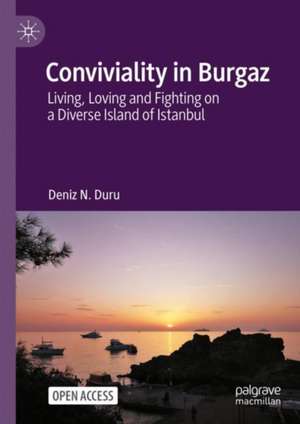Conviviality in Burgaz: Living, Loving and Fighting on a Diverse Island of Istanbul
Autor Deniz N. Duruen Limba Engleză Hardback – 23 mar 2024
This is an open access book.
Preț: 424.43 lei
Nou
Puncte Express: 637
Preț estimativ în valută:
81.21€ • 88.50$ • 68.44£
81.21€ • 88.50$ • 68.44£
Carte tipărită la comandă
Livrare economică 23 aprilie-07 mai
Preluare comenzi: 021 569.72.76
Specificații
ISBN-13: 9783031523335
ISBN-10: 3031523334
Ilustrații: XIII, 269 p. 13 illus.
Dimensiuni: 148 x 210 mm
Greutate: 0.49 kg
Ediția:2024
Editura: Springer International Publishing
Colecția Palgrave Macmillan
Locul publicării:Cham, Switzerland
ISBN-10: 3031523334
Ilustrații: XIII, 269 p. 13 illus.
Dimensiuni: 148 x 210 mm
Greutate: 0.49 kg
Ediția:2024
Editura: Springer International Publishing
Colecția Palgrave Macmillan
Locul publicării:Cham, Switzerland
Cuprins
Chapter 1: Introducing conviviality: Ebru-like Living in Burgaz.- Chapter 2: Embodying Diversity as a Burgaz Islander: Sharing Space, Senses, Memory and Labour.- Chapter 3: Ebru: The Islanders’ Representation of Conviviality.- Chapter 4: Testing the Strength of Conviviality: Love, Intermarriage and Solidarity in a Homogenising Turkish context. Chapter 5: Performance of Pluralism and Labour of Peace: In Between Conviviality and Coexistence/toleration.- Chapter 6: Conviviality and Politics of Recognition: Fixing Ambiguity, Losing Heterogeneity.- Chapter 7: Conclusion.
Notă biografică
Deniz N. Duru is a Senior Lecturer at the Department of Communication and Media at Lund University. She holds a PhD/Dphil in Anthropology from the University of Sussex and worked in the Sociology Department at the University of York and at the Media, Cognition and Communication Department at the University of Copenhagen. Her research interests include conviviality, multiculturalism, diversity, social media, media anthropology, anthropology of Turkey, and refugees and migrants in Europe. She has published journal articles in the South European Society and Politics, Southeast European and Blacksea Studies and Journal of Ethnic and Migration Studies and several book chapters. She currently teaches Digital Ethnography, Digital Research Methods, Media and Diversity, Public Opinion Building, and Media Content Analysis.
Textul de pe ultima copertă
“This insightful ethnography provides a captivating exploration of Burgaz Island where different classes and ethno-religious groups live together. Through the concept of "conviviality," Dr Duru reveals the dynamic social interactions that shape the island's way of life and the islanders’ collective identity. This book offers valuable insights for scholars, students, policymakers, and anyone interested in understanding the potential for shared lives across diverse communities.”
-Elif S. Uyar, Department of Sociology, Çanakkale Onsekiz Mart University, Turkey
This open access book tells stories of conviviality, solidarity, and everyday management of conflicts and tensions, by building on original, long-term ethnographic research (fourteen months in 2009-2010, followed by fieldwork trips until now) on Burgaz, an island home to more than twenty ethnic and religious groups from different socio-economic backgrounds. The island provides an excellent case study of post-Ottoman conviviality, as the homogenisation process during the nation-building stage of modern Turkey triggered migrations from the island, especially of non-Muslims, yet the island’s population retains elements of its Byzantine and Ottoman diversity. The book explores the islanders’ representation of diversity through ethnographic research, media analysis and interviews, and shifts the analytical framework of Post-Ottoman plurality from “coexistence/toleration” to that of conviviality. The author critically engages with the literature on multiculturalism and cosmopolitanism and conceptualises conviviality as both living together in diversity as shared ways of living as well as living with difference. The book further explores the relationship between conviviality, solidarity, coexistence/toleration, intoleration and nationalism.
Caracteristici
Provides an anthropological analysis of pluralism as the embodiment of diversity through shared experiences Builds on an anthropology of media perspective, analyzing novels and documentary films from Burgaz Explores the relationship between conviviality, toleration/coexistence, and intolerance This book is open access, which means that you have free and unlimited access
